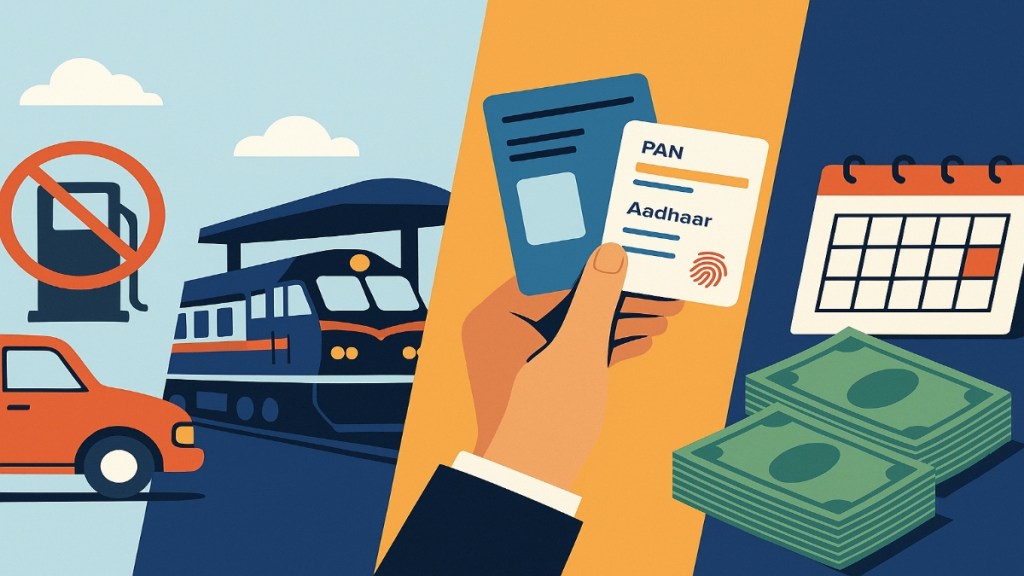From July 1, 2025, a series of key regulatory and policy changes will come into effect across India, touching everything from vehicle use and railway travel to financial compliance. These new rules aim to improve environmental quality, enhance digital transparency, and modernise public services. Here’s a comprehensive look at what’s changing.
Delhi bans fuel for end-of-life vehicles
In a major move to combat air pollution, Delhi will ban petrol pumps from supplying fuel to End-of-Life (EoL) vehicles. This includes diesel vehicles older than 10 years and petrol/CNG vehicles older than 15 years, irrespective of their registration state.
The Transport Department, Delhi Police, Traffic Police, and the Municipal Corporation of Delhi (MCD) will strictly enforce the ban. Vehicles found violating it will be impounded and owners will face hefty fines. Fuel stations must maintain logs of denied refueling transactions and display clear signage informing customers of the new rules.
This rule is in line with directives from the Commission for Air Quality Management (CAQM) and is aimed at significantly reducing vehicular emissions in the capital, which continues to battle severe air pollution levels year-round.
Indian Railways revises fare and booking rules
From July 1, fares for most Indian Railways services will rise modestly. Non-AC coaches will see an increase of 1 paise per kilometre, while AC classes will incur a 2 paise/km hike. These changes affect ordinary, mail/express, and premium trains.
However, there will be no fare increase for suburban train services, second-class ordinary travel up to 500 km, or monthly season tickets.
Starting July 1, Aadhaar verification becomes mandatory for booking Tatkal tickets online. By July 15, offline ticket booking at reservation counters will also require OTP-based Aadhaar authentication.
Another key change is in chart preparation. The final reservation chart will now be prepared eight hours before a train’s departure, up from the current four hours. This gives waitlisted passengers more time to plan alternatives if their tickets don’t get confirmed.
Aadhaar-PAN Linking
Beginning July 1, Aadhaar will be the only accepted identity proof for new PAN card applications, replacing documents like voter ID and birth certificates. This move aims to streamline identity verification and improve tax compliance.
ITR filing extended
The income tax return filing deadline for the 2025-26 assessment year has been extended to September 15, 2025, providing taxpayers with an additional 46 days to file.
Banking and card charges revised
Major banks including SBI, HDFC, and ICICI will introduce new service charges on ATM transactions, credit card bill payments, and cash withdrawals or deposits. Customers are advised to check their respective bank’s official websites for detailed updates.
UPI and LPG revisions
Changes in UPI payment procedures and LPG cylinder pricing are also expected from July 1. While exact details may vary by provider or bank, users should stay updated with app notifications or check with their banks and gas agencies.
National ELV compliance
In addition to Delhi’s local fuel ban, nationwide ELV regulations introduced in April 2025 require automakers, scrap dealers, and large consumers to register with pollution control boards. Non-compliance can lead to penalties. These reforms aim to promote responsible scrapping and environmental recovery across the country.
ATM cash withdrawal rules
Starting July 1, 2025, several banks in India have revised their ATM withdrawal and credit card fee structures as follows:
Customers will face general ATM withdrawal charges. After exhausting free monthly limits, banks will charge Rs 23 per ATM cash withdrawal transaction (plus applicable GST). This is an increase from the previous Rs 21 per transaction fee introduced in 2022.
However, for own-bank ATMs, there will be five free transactions per month. For other-bank ATMs, three to five free transactions per month depending on bank and location.
Credit card fees and charges
SBI credit cards (from July 15, 2025): Removal of complimentary air accident insurance cover (up to Rs 1 crore on premium cards and Rs 50 lakh on some others)
HDFC Bank credit cards (from July 1, 2025): 1% fee (capped at Rs 4,999/month) on monthly spends exceeding Rs 50,000 on online gaming and high-utility payments. There will be no reward points on gaming-related expenses. Also, monthly reward point caps have been introduced for various card types.
These changes aim to offset rising operational costs for banks, promote digital transactions, and revise credit card fees and benefits.


